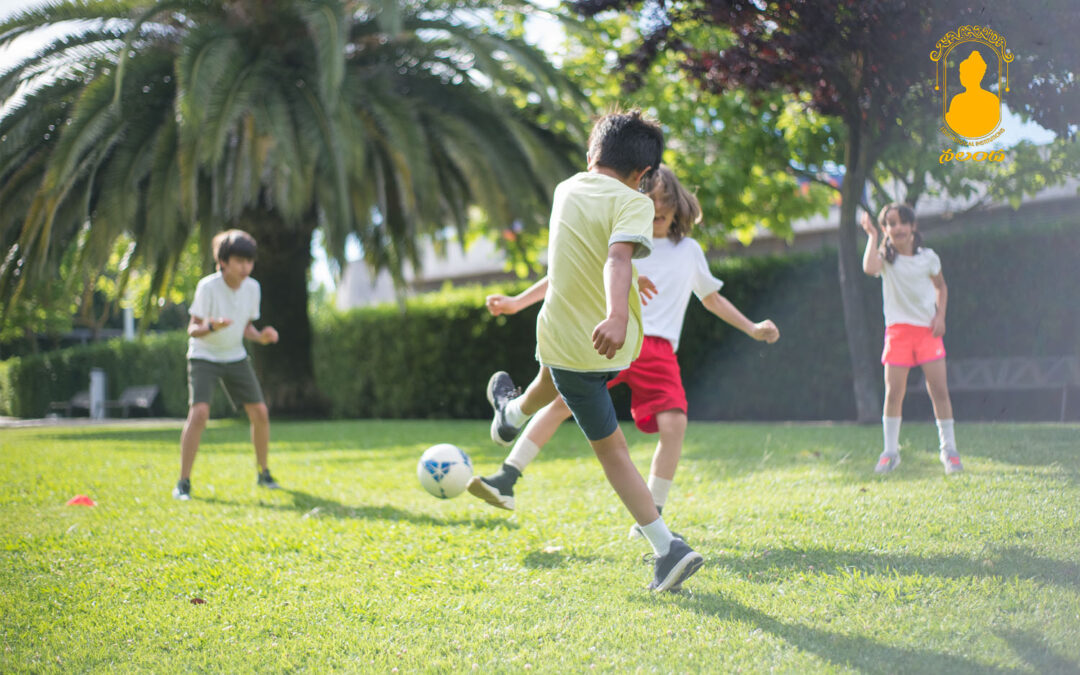The importance of sports in learning has been thoroughly researched and proven to be the best for your child. This is because children learn to think creatively and interact socially by playing games like peekaboo, patty-cake, and playing house. It helps the child in building bonds, thinking critically, and decision-making. The children learn the difference between right and wrong. They learn teamwork and fair play. The child develops physically, emotionally and learns social skills like building a conversation and accepting individual opinions. It also helps them communicate and express themselves better. In short, play is the epitome of your child’s development, “Play is how children learn.”
Playing adds creativity in early childhood stages and increases dopamine, reducing stress among children. It helps them connect with the social and natural environment simultaneously. Playing also helps children gain perspective, learn to compromise, accept defeat and appreciate talent. Let us look into some benefits of playing in detail:
BENEFITS OF PLAYING SPORTS AND GAMES:
The importance of play for learning has been proven to be the best way of learning for children. Playing helps in more than just fun. Kids learn more while enjoying and having fun than sitting at a study table and reading journals. Playing sports and games provides a primary foundation for learning, exploring, problem-solving, and building an understanding of the world. But how do children learn while playing? Well, it’s simple. Playing and creativity in early childhood allows children to inherit what they see, practice skills they see, and learn from other children. For example games like “Name, Place, Animal, Thing” helps the child improve thought process and enhance memory. It gives them a canvas of creativity, experimentation, and the ability to make choices, decisions for themselves. Play also increases the interactive compatibility with other children.
Cognitive benefits of playing for children:
Playing and creativity in early childhood help children understand situations and reinforce memory to create an understanding of cause and effect. It helps kids explore the world and their role in this ample space. Young children learn the art of individuality and acceptance. It gives them the liberty to explore their senses and encourages intellectual curiosity. For example in games like “lock and key” the children understand teamwork, learn to abide by the rules. They read the situation of the game when they are locked and respond quickly when they are given the key. These skills are a foundation of intellectual development and proactive thought processing. The importance of playing in learning lay also as an inspiration to create a new set of ideology. Creative and open-ended games like cardboard boxes, clay, sand and building bricks help children conceptualize ideas, brainstorm thoughts, and practice critical skills.
Physical benefits of playing for children:
Children become physically stronger when they play regularly. Play is a definite plus to their health, body fitness, and daily activity. The importance of play in learning increases movement by performing encouraging activities. It also increases energy, stamina, flexibility, and body awareness. In addition to this they also benefit in terms of strength, balance, dexterity, coordination, self-confidence. Play is configured in various forms like running, jumping, swimming, block building, dancing, riding bikes, and climbing trees.
Social Benefits of playing for children:
As mentioned earlier, the best primary school in Hyderabad uses playing as an integral part of their curriculum and is beneficial for socially anticipating the various capacities of the children. It helps children learn to interact and respond to individuals. Children understand social expectations and rules through play, and it also provides opportunities to share thoughts and ideas, listen, and compromise.
Emotional Benefits of Playing for Children:
Moreover, the importance of play in learning enables children to understand and process the abilities of their emotions. Kids often process their feelings and new concepts through play. Their ideology and personality are shaped by the play they like and choice they make as individuals. For example, when a child loses the game, they learn to accept defeat, process sadness, channel anger, and express grief. Best primary schools in Hyderabad have a set curriculum for play because they are aware of the fact that playing also helps build confidence, shape personality, encourages child development progress, their identity and self-esteem.
The best primary schools in Hyderabad, such as Nalanda understand the importance of play in a child’s life and configure a curriculum that helps the child think, have fun, and learn at the same time.


Recent Comments